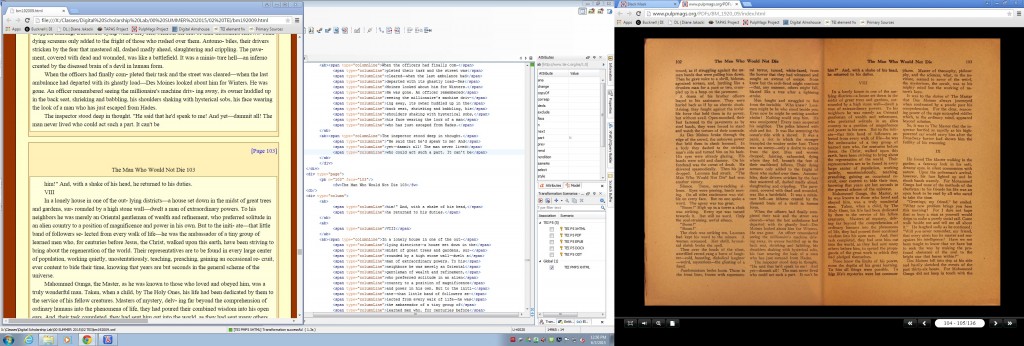[Reprinted from an article by Kristina Rodriguez ’19 (Staff Writer) in The Dickinsonian: The Dickinson College Student Newspaper, from October 15, 2015]
As the field of Digital Humanities grows in academia, Dickinson continues to integrate it into the curriculum, and is currently sponsoring training opportunities and a new Pulp Magazine digital archiving project.
The term Digital Humanities is inclusive of “a wide range of activities, from online preservation and digital mapping to data mining and the use of geographic information systems, data visualization and digital publishing,” according to the Digital Humanities Advisory Committee (DHAC) page on Dickinson’s website.
“Digital humanities considers the text, object and world in digital terms, explained Patrick Belk, the current post-doctoral fellow in Digital Humanities. “It acknowledges the ways in which scholarship, teaching and social activities are themselves increasingly digital and often taking place online.”
Belk is working on a few different projects in the Digital Humanities at Dickinson, including Digital Boot Camp and the Pulp Magazines Project.
The Digital Boot Camp at Dickinson College is a 10-day training program to teach students to be able to participate in the digital age more efficiently through digital tools and skills such as WordPress, editing videos and using Geographic Information Systems to make maps.
The program this academic year can take up to 10 students who would receive a $350 stipend, training materials and campus housing from Jan. 18 to 22. Interested students must apply by 5 p.m. on Friday, Nov. 20 to participate in the boot camp.
Rachel Kruchten ’16 attended Dickinson’s first Digital Boot Camp two years ago.
“I was recommended for the Boot Camp because I was working as the Digital Services Assistant in the library and had very little experience with digital technology, ironically enough,” explained Kruchten. “The overall experience of the Boot Camp was positive and gave me tools that I ended up using over the next two summers working on the Carlisle Indian School project. I have continued to engage with digital humanities beyond the boot camp, and I highly recommend it for other students as I think it has given me a better understanding of the integration of science, technology and the humanities, and I know the skills I have learned will be useful for me in the future.”
From last spring to the current semester, students have been working on Belk’s Pulp Magazine Project. Victoria DeLaney ’17, Harris Rissell ’16, Jenna Howdyshell ’17, Katie Lasswell ’17 and Edgar Estrada ’18 have contributed to the project thus far. The goal of this project is to complete TEI/XML P5 “mark-up for…the 320 magazines available on the Pulp Magazines Project website,” Belk’s personal project in Digital Humanities.
Belk is also collaborating with Vy Huynh ’18 this semester “to develop new and experimental search features, designed for exploring popular periodicals through their character-based, plot-driven fiction.”
Another project that Belk works with is the Humanities Lab, which is used to help students develop skills such as close reading, deep interpretation of text and critical analysis when conducting Humanities research. Students involved in this project “are building infrastructures for digital research and enabling increasingly sophisticated modeling of digital texts by adding layers of mark-up to facilitate more complex interactions between texts and computers,” Belk said.
The DHAC webpage also includes information about Digital Humanities projects with which students can get involved, such as: Russian Rooms, where there are photos of Russian citizens that individuals are able to read biographies on as well as listen to interviews and get a taste of the Russian culture; Eighteenth Century Poets Connect, a project to see relationships among individuals in the literary field in Britain during the 1730s; and Women’s Experiences at Dickinson College, a site meant for the women of Dickinson College to digitally voice their collective stories.
Frank Vitale ’16 interned over the summer in Oxford at Zooniverse, a research group that builds crowdsourcing platforms for science and humanities projects. The projects at Zooniverse “allow for people without specialized training to contribute to real research,” Vitale said.
“More students should get involved with digital humanism, and consider it as a serious and worthwhile academic pursuit,” Vitale said. “The political scientist, linguist, historian, philosopher, classicist, sociologist, archeologist, et cetera of old are being replaced by those who can use digital tools to innovate and expand their fields in new and previously unimaginable directions. The digital humanities truly are the new frontier for our generation of humanists, and those without the skills to keep up will be left behind.”
“In many ways, Digital Humanities is no different than ordinary humanities. We still read texts, tease out their meanings, interpret our results, analyze patterns and draw connections between them,” said Belk. “The main difference is that now we can do those things digitally.”
